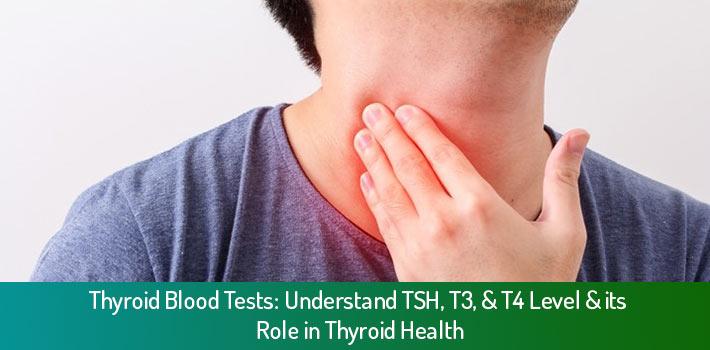T3 (triiodothyronine) and T4 (thyroxine), two crucial thyroid hormones that are involved in metabolism, are produced by the gland. Hormone over or underproduction can be a sign that the thyroid gland isn’t working properly. The condition is called hyperthyroidism when the hormone levels are above normal, and hypothyroidism when they are abnormally low. It is important that you check your thyroid regularly, but how often? That solely depends on the fact that you are suffering from hypothyroidism or hyperthyroidism. While thyroid can result in fast weight gain and loss, it can also result in various health issues that may hamper your daily life. Keep reading this blog to understand how frequently you should get your thyroid profile test or thyroid blood test done, for proper treatment and maintain healthy levels of thyroid hormones.
What is Hyperthyroidism?
A thyroid that is hyperactive may be the root of this illness. A condition known as Graves’ disease is the most typical autoimmune ailment to cause hyperthyroidism. Fast metabolic rates cause high heart rates, high blood pressure, and hand tremors as symptoms. Frequent bowel movements, an enlarged thyroid gland, exophthalmos (prominent eyes), weight loss, an irregular menstrual cycle, increased hunger, nausea, poor focus, anxiety and restlessness, hair loss, and trouble sleeping are other symptoms.
What is Hypothyroidism?
Most patients with hypothyroidism are middle-aged or older. Depending on how severe the insufficiency is, it manifests as one or more of the following symptoms: Fatigue and weakness, weight gain, aversion to the cold, forgetfulness, dry skin, constipation, depression, throbbing or stiff joints, thinning hair and brittle nails, and an increase in blood cholesterol levels.
Yellowing of the skin and eyes, frequent choking, a protruding tongue, and a bloated face are some of the symptoms that can be present in babies, although this is a rare condition in babies. Additionally, they struggle with muscular tone, drowsiness, and constipation. Stunted growth, delayed emergence of permanent teeth, postponed puberty, and inadequate mental development is common in children and teenagers.
How Often Should I Get Tested?
To ensure that your Thyroid Stimulating Hormone (TSH) levels are within the normal range if you have hypothyroidism, you should have your levels checked through a thyroid check-up once a year.
Your doctor may recommend testing your TSH and FT4 levels once a month to assess how your therapy is doing if you have been diagnosed with hyperthyroidism, and then less regularly after that. The frequency of testing, however, will be discussed with you after a diagnosis and will depend on your response to therapy.
What Does a Thyroid Blood Test Measure?
During a thyroid blood test, the following three hormones are principally assessed:
● Hormone that stimulates the thyroid (TSH)
● Thyroxine (T4, free direct) (T4, free direct)
● Triiodothyronine (T3, free) (T3, free)
The most sensitive thyroid function biomarker, TSH, is frequently used to check if your hormone replacement medication is functioning as it should. While low levels denote an underactive thyroid, high levels frequently signify an overactive thyroid. It’s important that you understand T3, T4, TSH and Test normal range.
By checking the blood’s free T3 (FT3) level, thyroid issues can be discovered. Low levels signify an underactive thyroid, whereas high levels signify an overactive thyroid.
T3 is useful for:
● Check your thyroid function with this test.
● Identify an active thyroid (hyperthyroidism)
Only when diagnosing or assessing the degree of hyperthyroidism is T3 truly needed. T4 levels are frequently utilised in conjunction with presenting symptoms rather than alone to determine whether a thyroid issue exists.
Two additional biomarkers can be included in a test for thyroid, and they are as follows:
● Antibodies against Thyroglobulin
● Antibodies to thyroid peroxidase
The thyroid gland stores the protein thyroglobulin, which helps produce T3 and T4. Antibodies against thyroid peroxidase aid in the diagnosis of autoimmune thyroid illness.
Why Is Thyroid Check-Up Important?
Hypothyroidism can cause other problems such as goitre, heart troubles, myxedema, mental health problems, infertility, peripheral neuropathy, and birth defects if it is not treated. Only via testing may the condition be identified early enough to prevent complications and to identify potential, potentially dangerous causes.
Early hyperthyroidism detection and management through tests for thyroid aid in avoiding difficulties brought on by conditions like Graves’ disease, which worsens with time and poses a life-threatening threat. Additionally, atrial fibrillation, a common but hazardous type of irregular heartbeat that disrupts blood flow and may result in strokes, and congestive heart failure can be brought on by hyperthyroidism.
How Can I Get The Test Done?
Now how to check thyroid is a common question, and here is the answer. Unlike many other tests getting your thyroid blood test done is simple and not at all time-consuming. But it is extremely important to get it done from a reputed and trusted place, so we suggest you visit Likhitha’s Diagnostics centre in Hyderabad. They are one of the most trusted centres in India with branches all across the country. You will not only feel at ease with them but also experience the professionalism and care of each of their patients. If you are unable to visit the diagnostic centre you can simply call them and book your testing appointment from home. They offer you sample pickup from the home facility. So, what are you waiting for, now that you know how important frequent testing can be, book your thyroid check-up appointment today!
